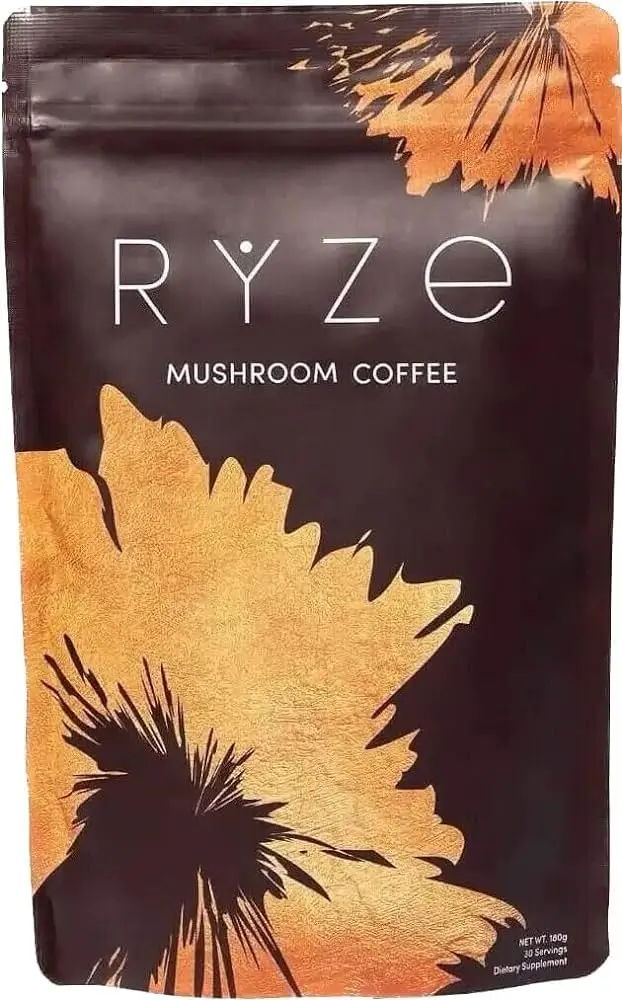In recent years, the buzz around mushroom coffee has grown significantly, with many health enthusiasts embracing this unique beverage as a potential superfood.
One brand that has gained considerable attention is Ryze, which offers a distinctive blend of coffee and various mushroom varieties.
As more people seek healthier alternatives to their daily caffeine fix, the question arises: Is Ryze mushroom coffee good for you?
In this article, we’ll delve into the potential benefits, ingredients, and overall impact of this innovative product.
What is Ryze Mushroom Coffee
Ryze mushroom coffee is a unique beverage that combines the rich flavor of coffee with the purported health benefits of functional mushrooms.
Founded by a team passionate about wellness and sustainability, Ryze aims to provide an alternative to traditional coffee that not only delivers a natural energy boost but also offers potential advantages for overall well-being.

The key ingredient that sets Ryze apart from regular coffee is the inclusion of various mushroom varieties, such as Lion’s Mane, Chaga, Cordyceps, and Reishi.
These mushrooms have been used in traditional medicine for centuries and are believed to offer a range of health benefits, from boosting immunity to supporting cognitive function.
What Are the Benefits of Ryze Mushroom Coffee?
One of the primary reasons people are drawn to Ryze mushroom coffee is the potential health benefits it offers.
Let’s explore some of the most notable advantages associated with this unique beverage:
Potential Cognitive Enhancement
Lion’s Mane mushroom, a key ingredient in Ryze’s blend, is renowned for its potential to support brain health and cognitive function.
Studies have suggested that compounds found in Lion’s Mane may promote the growth and protection of neurons, potentially improving memory, focus, and overall cognitive performance.
Antioxidant Properties
Several of the mushrooms used in Ryze’s blend, such as Chaga and Reishi, are rich in antioxidants.
Antioxidants help neutralize harmful free radicals in the body, which can contribute to oxidative stress and various chronic conditions.
By incorporating these mushrooms into your daily routine, you may benefit from their antioxidant properties.

Immune System Support
Certain mushrooms, like Reishi and Cordyceps, have been traditionally used to support immune function.
These mushrooms contain compounds believed to enhance the activity of various immune cells, potentially improving the body’s ability to fight off infections and diseases.
Potential Anti-inflammatory Effects
Inflammation is a natural response of the body to protect itself from harm, but chronic inflammation can contribute to various health issues.
Some of the mushrooms used in Ryze’s blend, such as Reishi, have been studied for their potential anti-inflammatory properties, which may help alleviate symptoms associated with inflammatory conditions.
Natural Energy Boost
While Ryze mushroom coffee contains caffeine from the coffee component, it also includes adaptogens like Cordyceps, which are believed to help the body adapt to stress and promote balanced energy levels.
This combination may provide a smoother, more sustained energy boost without the typical crash associated with regular coffee.
Understanding the Ingredients in Ryze Mushroom Coffee
To truly appreciate the potential benefits of Ryze mushroom coffee, it’s essential to understand the key ingredients that make up this unique blend:
Coffee Beans
Ryze uses high-quality Arabica coffee beans as the base of their mushroom coffee.
These beans provide the familiar rich flavor and caffeine content that coffee drinkers enjoy.
Lion’s Mane Mushroom
Lion’s Mane, also known as Hericium erinaceus, is an edible mushroom with a unique appearance resembling a lion’s mane.
It is highly regarded for its potential cognitive-enhancing properties and is believed to support brain health and neuronal function.

Chaga Mushroom
Chaga (Inonotus obliquus) is a fungus that grows predominantly on birch trees in colder climates.
It is highly valued for its antioxidant properties and has been used in traditional medicine for centuries.
Cordyceps Mushroom
Cordyceps (Cordyceps militaris) is a parasitic fungus that has been used in traditional Chinese medicine for its potential to support energy levels, enhance physical performance, and promote overall well-being.
Reishi Mushroom
Reishi (Ganoderma lucidum), often referred to as the “mushroom of immortality,” is a highly revered fungus in traditional Chinese medicine.
It is believed to offer a range of potential benefits, including immune support, anti-inflammatory properties, and stress management.
Other Ingredients
Ryze mushroom coffee may also contain additional ingredients, such as cinnamon, cocoa powder, or natural sweeteners, depending on the specific blend or flavour profile.
What Are the Side Effects of Ryze Mushroom Coffee?
Ryze mushroom coffee is generally considered safe for most people when consumed in moderation.
Potential side effects may include caffeine-related symptoms like jitters, headaches, or insomnia if consumed in excess.
Some people may experience digestive issues or allergic reactions to specific mushroom varieties.
Is Ryze Mushroom Coffee Right for You?
While Ryze mushroom coffee offers potential health benefits, it’s important to consider your individual needs and preferences before incorporating it into your daily routine.
Here are some factors to consider:
Caffeine Sensitivity
If you are sensitive to caffeine or have concerns about caffeine intake, it’s essential to monitor your reaction to Ryze mushroom coffee.
While the caffeine content may be lower than traditional coffee due to the dilution with mushroom extracts, it still contains caffeine from the coffee beans.

Dietary Restrictions and Allergies
Ensure that you carefully review the ingredient list of Ryze mushroom coffee to identify any potential allergens or ingredients that may conflict with your dietary restrictions or preferences.
Medication Interactions
If you are taking any medications, it’s advisable to consult with your healthcare provider before incorporating Ryze mushroom coffee into your routine.
Some mushroom extracts or compounds may interact with certain medications, affecting their efficacy or causing potential side effects.
Personal Taste Preferences
While Ryze aims to create a flavorful blend, the addition of mushroom extracts may alter the taste profile of the coffee.
It’s essential to consider whether you enjoy the unique flavor combination before committing to a regular consumption routine.
How to Incorporate Ryze Mushroom Coffee into Your Daily Routine
If you decide to give Ryze mushroom coffee a try, here are some tips for incorporating it into your daily routine:
Start Slowly
If you are new to Ryze mushroom coffee, it’s best to start with a smaller serving size and gradually increase your intake.
This approach allows your body to adjust to the new ingredients and monitor any potential reactions.
Experiment with Different Brewing Methods
Ryze mushroom coffee can be brewed using various methods, including drip coffee makers, French presses, or pour-over techniques.
Experiment with different brewing methods to find the one that best suits your taste preferences and desired strength.
Pair it with a Balanced Diet
While Ryze mushroom coffee may offer potential health benefits, it’s important to remember that it should be part of an overall balanced diet and lifestyle.
Incorporate it alongside a diet rich in whole foods, regular exercise, and stress management practices for optimal well-being.
Is Honey Green Tea Good for You?
Track Your Experience
As with any new supplement or dietary addition, it’s a good idea to track your experience with Ryze mushroom coffee.
Note any changes in energy levels, cognitive function, or overall well-being to determine if it is providing the desired benefits for you.
Is Ryze Mushroom Coffee Good for Your Liver?
There is no specific evidence that Ryze mushroom coffee has direct benefits for liver health.
However, some of the mushrooms used, like Reishi and Chaga, are rich in antioxidants that may help protect the liver from oxidative stress and support its detoxification processes.

Does Mushroom Coffee Make You Poop?
Mushroom coffee, including Ryze, may have a mild laxative effect due to the fiber content and compounds found in certain mushrooms like Reishi.
However, this effect is generally mild and varies from person to person based on individual sensitivity.
Is Mushroom Coffee Good for Weight Loss?
While mushroom coffee itself is not a weight loss supplement, it may support weight management efforts indirectly.
The potential appetite-suppressing effects of caffeine, along with the fiber and nutrient content of mushrooms, could aid in feeling fuller for longer periods.
However, a balanced diet and regular exercise are still crucial for sustainable weight loss.
Final Thoughts
Ryze mushroom coffee presents an intriguing and potentially beneficial addition to your daily routine, combining the familiar taste of coffee with the purported health benefits of functional mushrooms.
While the research on the specific effects of these mushroom extracts is ongoing, many people have reported positive experiences with Ryze, citing improved energy levels, cognitive function, and overall well-being.
Ultimately, the decision to incorporate Ryze mushroom coffee into your diet will depend on your individual needs, preferences, and health goals.
If you are interested in trying this unique beverage, it’s recommended to consult with a healthcare professional, especially if you have any underlying health conditions or are taking medications.

